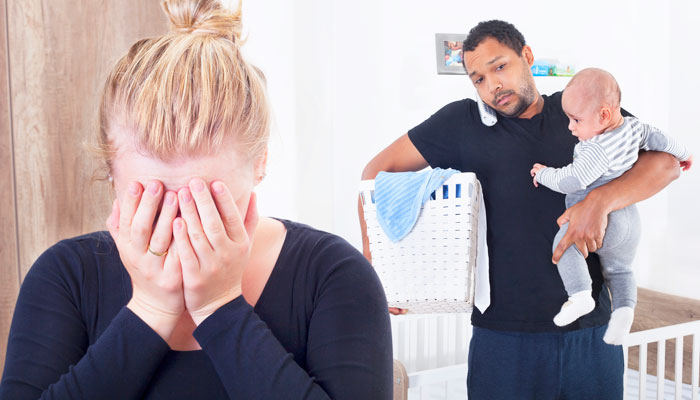If You Don’t Feel Yourself, You Could have Postpartum Depression
Depression, especially when it’s affected by pregnancy, can be so insidious. It creeps in and you just brush it off as “I’m just stressed right now,” or “My body is growing a baby or recovering from it.”
And after a while, you accept irritability, sadness, anxiety or exhaustion as parts of your life as a parent.
But these symptoms are not normal.
Feeling constantly overwhelmed, irritable or sad is not a normal part of pregnancy or caring for a baby. It can be depression during pregnancy or postpartum depression, and you can get help.
We talked with Dr. Susan Hicks, OB/GYN, of University of Michigan Health – West, to discuss some of the symptoms of perinatal mood disorders and how you can reach out for help.

Postpartum Depression Symptoms and When to Seek Help
“The most important thing I stress to my patients is that postpartum depression is a real illness and it can be treated. I also tell them the symptoms are not a sign of personal weakness, it’s not their fault and it’s nothing to be ashamed of,” shares Dr. Hicks.
As your body, mind and routines change post-baby, you may be flooded with odd feelings of sadness or emptiness. Or you may wonder why you don’t seem to have any significant emotions at all.
During those first two weeks after baby is born, those feelings are common. Some refer to it as the baby blues, and it’s a natural reaction as you adjust to life with a newborn.
However, there are signs, symptoms and feelings that signal a more serious concern: postpartum depression.
“One out of seven moms, and one out of 10 dads, develop postpartum depression or perinatal mood anxiety disorder,” says Dr. Hicks.
One mom on our team had severe baby blues with her third child – and it didn’t go away after two weeks. Just being asked, “How are you doing?” brought her to tears.
If you are experiencing any of the symptoms below, beyond two weeks postpartum, Dr. Hicks says it’s time to talk with your physician.

Symptoms to Bring up With Your Doctor Postpartum
- Anxiety
- Excessive worry, nervousness
- Sadness, depression
- Difficulty concentrating
- Guilt
- Fatigue
- Change in appetite
- Difficulty with making decisions
- Hopelessness
- Difficulty managing anger and irritability
Postpartum depression becomes a more serious concern when patients experience a combination of these red flag symptoms. If you or a loved one is experiencing these serious symptoms, please reach out for help.
Postpartum Depression Symptoms That are Red Flags
- Suspicious of family or visitors
- Experiencing scary thoughts
- Very withdrawn
- Loss of interest in normal activities
- Confusion, unable or unwilling to care for yourself
- Trouble bonding with baby
- Thoughts of hurting yourself or baby
“We use the Edinburgh Scale to determine the severity of postpartum depression,” notes Dr. Hicks. “Patients complete a short questionnaire and if they score above 11, we have a conversation about treatments.”

How Long Does Postpartum Depression Last? – It Really Ranges
You can get hit with a perinatal mood disorder even when your kids is 2. It doesn’t just happen to moms with newborns.
I know a Grand Rapids mom who developed it when her second child was 14 months old. She never even had it with her first. Another was diagnosed when her daughter was 21 months old (“delayed onset triggered from weaning”). I had depression during pregnancy for all three of mine but it went away the moment my babies were born.
Postpartum depression doesn’t magically go away when your child is a certain age, unfortunately. It’s different for every woman, so it’s critical that you seek help when you experience it.
PPD falls under a wide spectrum of what are considered perinatal mood disorders. This is a period of time that reaches as far back as pregnancy (prenatal depression), the first year postpartum, and as late as the weaning period (which can be anywhere from birth to three years).
Overall, that is an almost four year stretch of time where the ever shifting hormones and other physiological changes can make a mom more susceptible to PPD and other perinatal mood disorders.

Coping Strategies for Postpartum Depression or Depression During Pregnancy
Dr. Hicks remembers a patient who felt like she was in a cloud and couldn’t get out of it. It was hard to get up in the morning, and she was losing interest in caring for her baby. That patient scored a 12 on the Edinburgh Scale.
“In that particular case, we talked it through and discussed the coping strategies that would benefit her most.”
Coping Techniques for Postpartum Depression
- Talk with your doctor, another mother or friend
- Ask for help with chores and errands
- Find 15 minutes a day for yourself
- Eat a good, healthy diet
- Seek counseling
- Connect with other women experiencing the same thing
- Take medication
Dr. Hicks emphasizes that there are many different treatments and coping strategies available to new moms and dads now.
And remember, everyone is different, so what worked for your friend may not work for you. Try different strategies until you find the ones that help.
Where to Turn for Help with Postpartum Depression in Grand Rapids
If you are experiencing extreme anxiety, irritability, sadness, or any other significant mood change during pregnancy and the post-partum period, please reach out for help. There are organizations around West Michigan equipped to help you through this time.
Talk to your spouse or partner. Talk to your doctor. Reach out to a friend. Ask for help. Call one of these places. The doctors at U M Health-West have referred patients to these organizations.
If you know of others, please let us know in the comments!
MomsBloom
3292 North Evergreen Dr NE, Grand Rapids, MI 49525
Our programs were born to bring volunteers and families together to provide physical and emotional support to any family with a newborn – free of charge.
PineRest Mother & Baby Program
300 68th Street SE, Grand Rapids, MI 49525
One of only a few in the country, the Pine Rest Mother and Baby Partial Program is a short-term, intensive day program for women experiencing significant symptoms of postpartum depression and other perinatal mood and anxiety disorders (PMAD).
Counseling Center of West Michigan
Multiple campuses in Grand Rapids
Offering counseling services for moms who are struggling with postpartum anxiety and depression. Bonus: They offer CHILD CARE at their Grand Rapids location.
Mind Body Baby
2422 Burton St SE, Grand Rapids, MI 49546
Offering specialty health, fitness, and motherhood support classes for each stage of your journey to and through motherhood. With on-site childcare and mom-to-mom support, the collective is a space where mothers feel cared for. It also offers mental health, massage, chiropractic care, fourth trimester groups, and more.
Keep Seeking Help and Know That it Won’t Last Forever
“Years ago, postpartum depression was a taboo topic, and there weren’t as many resources,” says Dr. Hicks.
“Now, patients are much more open about their feelings and there’s an awareness around mental health.
“Postpartum depression is real. But the good news is, it won’t last forever .”


Spectrum offers a Tuesday night postpartum support group and the Maternal Wellness Program is a local nonprofit that offers weekly postpartum support groups at Grand Rapids Women’s Health and the 1st/3rd Thursday evening of every month at Renew Mama Studio.
We offer counseling services for moms in Grand Rapids who are struggling with postpartum anxiety and depression as we as just adjusting to changes that a new addition can bring on. Not only this, we offer childcare at our main location! As this can be such a major barrier for moms getting help, we wanted to be sure that this service was offered so moms (and dads) can get the time and attention they need to help their mental health.